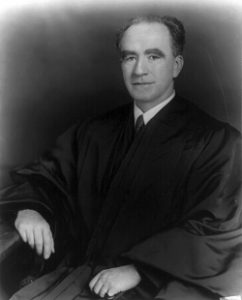In the history of the United States Supreme Court, a 1944 decision in the case of Korematsu v. United States has long stood out as a stain that is almost universally recognized as a shameful mistake. Yet that case remained law because no case gave the Court an opportunity to overrule it. On Tuesday, June 26, 2018, in a case involving a travel ban, Chief Justice John G. Roberts Jr. and a majority of the Supreme Court seized the opportunity to finally overrule Korematsu. Chief Justice Roberts, citing in part one of the dissenting opinions in the Korematsu case, stated in as clear of language as possible “Korematsu was gravely wrong the day it was decided, has been overruled in the court of history, and — to be clear — ‘has no place in law under the Constitution.’”
So what was the Korematsu case all about? Following the attack on Pearl Harbor, which led to the United States’ involvement in World War II, Americans of Japanese descent were treated poorly, and considered suspicious solely due to their ancestry. Shortly after the Imperial Japanese Navy attacked Pearl Harbor, President Franklin D. Roosevelt issued Executive Order 9066, which authorized the removal of 112,000 individuals of Japanese ancestry from their homes and their mandatory imprisonment in internment camps. Fred Korematsu, who had just been rejected from service by the U.S. Navy due to ulcers and instead began work as a welder at a shipyard to assist in the war effort, challenged the Order and refused to be relocated to one of the internment camps. In 1944, a majority of the U.S. Supreme Court upheld the internment of Japanese-Americans as a valid exercise of military authority.
 Justice Frank Murphy – the only U.S. Supreme Court Justice born in Michigan – dissented from the majority’s decision. He wrote an impassioned dissent that still resonates today. In his dissent, Justice Murphy condemned the majority’s decision and rejected its reasoning. Justice Murphy wrote that the decision was nothing more than the “legalization of racism” and concluded:
Justice Frank Murphy – the only U.S. Supreme Court Justice born in Michigan – dissented from the majority’s decision. He wrote an impassioned dissent that still resonates today. In his dissent, Justice Murphy condemned the majority’s decision and rejected its reasoning. Justice Murphy wrote that the decision was nothing more than the “legalization of racism” and concluded:
“Racial discrimination in any form in any degree has no justifiable part whatever in our democratic way of life. It is unattractive in any setting, but it is utterly revolting among a free people who have embraced the principles set forth in the Constitution of the United States. All residents of this nation are kin in some way by blood or culture to a foreign land. Yet they are primarily and necessarily a part of the new and distinct civilization of the United States. They must, accordingly, be treated at all times as the heirs of the American experiment, and as entitled to all the rights and freedoms guaranteed by the Constitution.”
Justice Murphy’s words must have resonated with another well-known man with Michigan ties. In 1976, President Gerald Ford signed a proclamation formally terminating Executive Order 9066 and apologizing for the internment, stating, “We now know what we should have known then — not only was that evacuation wrong but Japanese-Americans were and are loyal Americans. On the battlefield and at home the names of Japanese-Americans have been and continue to be written in history for the sacrifices and the contributions they have made to the well-being and to the security of this, our common Nation.”
Later, President Bill Clinton awarded the Presidential Medal of Freedom – the highest civilian honor in the United States – to Korematsu in 1998, saying, “In the long history of our country’s constant search for justice, some names of ordinary citizens stand for millions of souls: Plessy, Brown, Parks … to that distinguished list, today we add the name of Fred Korematsu.” After the attacks of September 11, 2001, Korematsu implored the U.S. to not let the same mistake happen to people of Middle-Eastern descent as what happened to Japanese Americans.
Justice Murphy’s words resonate today. We need to look back from the lessons of history as we move forward in this great nation of ours. A number of years ago, Joel Baar had the pleasure of representing a man who served during World War II. He told Joel the story of being interned in the internment camps due to his Japanese ancestry, and how a group of young men pleaded with the government to allow them to fight for their country – the United States. As a result, the 442nd Regiment of the U.S. Army was formed. They fought for their country – and fought well. To this day, the 442nd remains the most highly decorated regiment in United States’ armed forces history. Of the approximately 14,000 men who served in the 442nd, 9,486 Purple Hearts were awarded, along with 21 Medals of Honor.
-JWB
